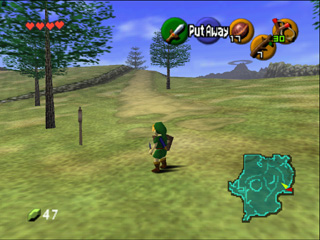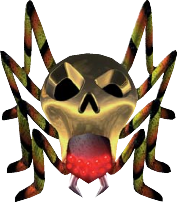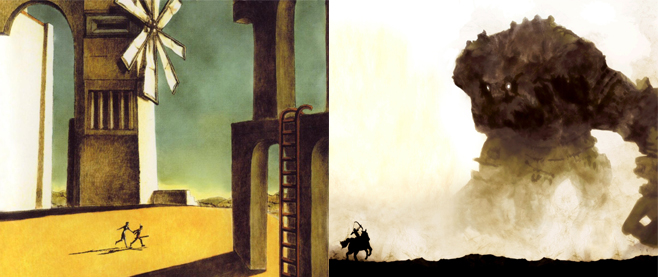
The Ocarina of Time Gone By
Today’s kids probably won’t remember whether they first played Angry Birds on their parents’ smartphones in the grocery line or Halo on their older cousins’ XBox, but I’m just old enough to remember a time before the ubiquity of gaming consoles and just young enough to have never played on a Nintendo 64 without feeling all retro about it. I remember my first videogame. And I remember when my love of gaming first started. Funny thing is, there were a few years between the two.
[pullquote]I named my rival Bob because I was at the age where the name Bob is hilarious.[/pullquote]
My very first videogame was Pokemon Red. I named the trainer Allie – even though this was before you could choose your character’s gender – and pretended it was an androgynous girl. I named my rival Bob because I was at the age where the name Bob is hilarious. For a year or so, my GameBoy went everywhere with me (it was teal-colored and clashed spectacularly with the bright red cartridge), but by the time the second generation came out I had started to lose interest. I think it was because I had been trying to treat all my Pokemon fairly and train them all equally and that much grinding was pretty exhausting and I was getting sick of the red-and-white checkered floors of the Pokemon Mansion and when I found that level ten Goldeen buried in the back of my scrupulously organized PC boxes the guilt was just so crippling that I turned the game off and never went back.
That was it for me for about five years, until the Nintendo GameCube. When it first came out, the GameCube was being packaged with a remastered version of the 1998 Nintendo 64 classic Legend of Zelda: Ocarina of Time that included a bonus version called Master Quest. I didn’t know any of that, of course. All I knew was that my brother had a new toy and, a few days later, he went out to play with his friends and left it on. (He probably hadn’t figured out how to save yet. We were all new at this.)
 The first thing I thought when I saw the TV screen was that this was a weird movie. Nothing was happening – the green and grey background was almost entirely motionless and there was nothing in the scene except for a little boy shuffling his feet. He looked faintly bored. Indeed, just then the little boy stretched his arms over his head and yawned. I laughed out loud.
The first thing I thought when I saw the TV screen was that this was a weird movie. Nothing was happening – the green and grey background was almost entirely motionless and there was nothing in the scene except for a little boy shuffling his feet. He looked faintly bored. Indeed, just then the little boy stretched his arms over his head and yawned. I laughed out loud.
The GameCube controller was lying on the ground in front of the TV, so I picked it up. As soon as my thumb touched the analogue stick, the little boy leaped forward as if electrocuted. I let go of the stick and he froze again, feet planted, arms by his side. The little boy looked vaguely around, as if bemused by his sudden start and stop. Then he shuffled his feet again.
I thought this was the coolest thing ever.
There was more. Tilting the analogue stick slightly made him walk like a normal person. When you press A, he does a front roll! If you press L and back and A, he does a backflip! And, best of all, if you timed your front rolls right, you could get him to crash into a wall or a tree! I must have spent about half an hour just running around what I later learned was called Kokiri Village, intermittently walking slowly (so as not to tire him out) and hurling him into walls (because I liked the way the screen shook when he hit it). When my brother came back inside, he wasn’t mad, because I hadn’t actually done anything except get him a whole lot of rupees from running through the grass.
It took us (by ‘us’ I mean my brother, Link and me) forever to get out of the Kokiri Forest. I would have been impressed if the whole game consisted of just the Deku Tree level. So when we departed from that little sylvan village, parted ways with Saria, crossed the bridge and broke through the treeline, I shared Link’s amazement at the wide open field awaiting us on the other side. This little world on the TV screen was so big! Pokemon had nothing on this, that I knew.
[pullquote]When we departed from that little sylvan village, I shared Link’s amazement at the wide open field awaiting us on the other side. This little world on the TV screen was so big![/pullquote]
A lot of people cite Ocarina of Time as “the best game ever.” I don’t know about that. There was a time where I would have fought vehemently for Ocarina of Time‘s right to the title, voted in all the GameFaqs and IGN “battles” and argued on the forums, but now when the topic comes up I mostly just like watching the Ocarina of Time people and the Final Fantasy 7 people scream at each other. That’s always good times. I’m prepared to argue that Ocarina of Time is a very good game, and there’s no doubt it’s one of my favorites. But I also know that a big reason why I love it is because it was the first. My first. I played it years after it first came out, but for me, who had never touched a game controller, it was newer than for most of the people who played it back in 1998. I didn’t even know what the word “trope” meant. Nowadays, we drown in tropes on a regular basis.
A few years ago I was talking about Ocarina of Time to a friend who hadn’t played it (yes, all you twenty-five and older readers: in my generation it’s not uncommon for self-professed gamers to have never played the gems of your childhood. Think about that for a moment). He was not impressed. “That sounds really cliche,” he said. I was outraged. “Ocarina of Time isn’t cliche. It’s the game that established the cliches! You can’t call the original cliche!” He shrugged. “Well if I play it now it’ll seem cliche to me.”
But the first time I played Ocarina of Time, everything was magical: Link’s awe upon waking from his seven-year-slumber to find that everything had changed; the mystery of Sheik and the final thrilling reveal; the thrill of leaving the mist and closed spaces of Kokiri Forest for the wide open fields and blue skies of Hyrule Field. The Gerudo Valley theme seemed like the best thing I’d ever heard. The sound of a Gold Skulltula scritch-scritching just out of reach seemed like the worst.
It seemed to me that anything was possible in that game. I didn’t really comprehend the limits of a game’s programming, didn’t know how to process the disparity between the Hyrule that could be and the Hyrule delineated in finite ones and zeros. Ocarina was an incredibly powerful game for its time–one of the first to support an environment that changed from day to night–but even for its time it was a relatively simple game, with wide open spaces that boasted the power of its 3D graphics more than they propelled the narrative or gameplay. Its limited scope and capability were masked by a minimalist aesthetic and a promise of enchantment, and to the twelve-year-old me, that mask was just about the most beautiful thing I’d ever seen.
 Case in point: the Gold Skulltulas. It was a pretty standard quest: kill 100 of the creatures called Gold Skulltulas and collect the tokens they drop. There was a narrative affixed to it–a bunch of people in Kakariko Village are cursed, and killing the Skulltulas saves them–little more than a thin chocolate coating on a bitter pill, but to my untrained eye it was delicious. Those poor, pathetic, blocky spider-people, with their sad eyes! When I first arrived at the house, one of the kids had already become a human again, because I’d happened to have killed ten Gold Skulltulas while button-mashing my way from the Kokiri Forest to Hyrule Castle and back again. And he was so happy that he couldn’t even stop doing these jerky jumping-jack sort of things. When the mommy spider asked me to save the rest of her kids, how could I refuse? Of course I’ll help you! I thought. I’m a hero, damn it, that’s what I do! I will catch them all!
Case in point: the Gold Skulltulas. It was a pretty standard quest: kill 100 of the creatures called Gold Skulltulas and collect the tokens they drop. There was a narrative affixed to it–a bunch of people in Kakariko Village are cursed, and killing the Skulltulas saves them–little more than a thin chocolate coating on a bitter pill, but to my untrained eye it was delicious. Those poor, pathetic, blocky spider-people, with their sad eyes! When I first arrived at the house, one of the kids had already become a human again, because I’d happened to have killed ten Gold Skulltulas while button-mashing my way from the Kokiri Forest to Hyrule Castle and back again. And he was so happy that he couldn’t even stop doing these jerky jumping-jack sort of things. When the mommy spider asked me to save the rest of her kids, how could I refuse? Of course I’ll help you! I thought. I’m a hero, damn it, that’s what I do! I will catch them all!
Since that time, I’ve played the hero in numerous virtual fantasy worlds. Ocarina of Time was just the gateway: First there was Super Smash Brothers Melee, of course, the second GameCube game my brothers and I got. I started off playing as Link, then switched to Young Link (He drinks milk! How cute!) before finally settling on Sheik/Zelda. I played Majora’s Mask, which blew my mind, and Windwaker, which didn’t, because even though Link was adorable and Tetra was awesome I missed Epona and Tingle was even creepier than that owl. I even dug out the old GameBoy, wrenched out that Pokemon Red cartridge and played Legend of Zelda: Oracle of Ages and Oracle of Seasons.
Meanwhile, my brothers were buying new games for the GameCube, so I poked around the Mario and Metroid franchises. By then I was good and committed to this whole gaming thing, so I went out and bought a PS2 and started playing the games that people compared to the Zelda series – Beyond Good and Evil, Okami, Ico and Shadow of the Colossus. All of these games owe so much to Ocarina of Time. All of them have borrowed liberally, and improved upon, the tropes and conventions that Ocarina of Time helped to pioneer.
 When I was younger and I imagined myself in my twenties (the age I am now) I always pictured my future apartment with a GameCube and my old Ocarina of Time disc sitting by the TV. I thought that whenever I got lonely or upset – yes, my dreams of the future included twenty-something ennui, moving on – future me would start up the old ’Cube and ride around Hyrule on my carrot-loving steed, shoot some Deku Seeds at that creepy-ass owl, maybe poke around for that Triforce a time or two again.
When I was younger and I imagined myself in my twenties (the age I am now) I always pictured my future apartment with a GameCube and my old Ocarina of Time disc sitting by the TV. I thought that whenever I got lonely or upset – yes, my dreams of the future included twenty-something ennui, moving on – future me would start up the old ’Cube and ride around Hyrule on my carrot-loving steed, shoot some Deku Seeds at that creepy-ass owl, maybe poke around for that Triforce a time or two again.
But now it’s 2013 and I haven’t played Ocarina of Time in – well, about seven years. The last Zelda title I played was Skyward Sword, just over a year ago, and I don’t really want to talk about that. I love the Zelda series, and I will fangirl about it with the best of ‘em. I just don’t think I’ll be playing any of the games anytime soon, Ocarina of Time especially.
Shigeru Miyamoto got the idea for Legend of Zelda when he imagined what it would be like if there was a miniature garden in his desk drawer. He wanted players to feel like they had stumbled across a little world they didn’t know was there. Well he succeeded, at least with me – that’s exactly how I felt when I first saw that little boy shuffling his feet in the forest on our basement TV screen in 2003. I think Link understands. After all, he left that forest too, and when he went back to defeat his enemy’s phantom, he found ghosts of his own haunting his childhood home. And when, at the end of the game, Zelda tries to undo the past by turning Link into a child again, Link looks sad, because he and I both know that sometimes, it’s better to leave memories where they are.
———
Born in 1990, Jill Scharr is the youngest member of Team Unwinnable, a fact that the others rarely let her forget. She may have been exaggerating slightly about some of that Pokemon Red drama earlier, but she’s not kidding about the Skulltulas. Follow her on Twitter at @JillScharr.



